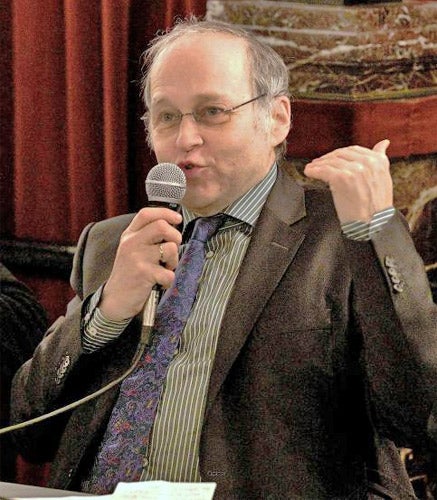Hungary's artists take fury at media law to Brussels

Hungarian writers and musicians have descended on Brussels to add their voices to a fast-growing chorus of criticism aimed at measures being introduced by their Prime Minister Victor Orban.
The outcry centres on a new media law that opponents say will muzzle press freedom and endanger independent media.
The EU has been piling pressure on Hungary to review the bill, which came into force on 1 January, the same day that the country took up the reins of the rotating EU Presidency.
Adam Fischer, one of the world's leading conductors, stood down at the end of last year as music director at the Hungarian State Opera in protest at the increasingly heavy and restrictive hand of government.
"A lot of the attention has focussed on the new law but the problems run far deeper," he told journalists gathered at La Monnaie, the Belgian opera house. "Even more worrying are changes to the national constitution that are being drafted and the rise of anti-Semitism, homophobia and xenophobia in Hungarian society,"
Mr Fischer pointed to the latest "attack" in which Hungarian pianist Andras Schiff became the butt of anti-Semitic remarks in a national newspaper after he wrote a column criticising new government measures. "Hungary is not like other EU countries. Things like anti-Semitic graffiti are tolerated. Attitudes are changing and extremist views taking hold."
Since winning last April's elections with a landslide victory, Mr Orban's populist Fidesz party has modified the constitution several times to fit its political aims and it has limited the powers of the country's top court. Mr Orban is also blamed for appointing party loyalists to key watchdog positions for unusually long terms.
At the European Parliament, up the road from La Monnaie, more Hungarian artists were gathered to sound the alarm over the new media law.
Hungarian author Miklós Haraszti said that in setting out the "tasks" of media in Hungary, the government was taking a step "unprecedented in Europe". "The law also removes the tenet of pluralism and replaces it with a monolithic task," he said. Others pointed to the importance of upholding press freedom in a country that has been under the yoke of Soviet rule for decades.
Mr Orban took a combative stance towards his international critics last week, saying it was "an insult" for countries like France and Germany to point the finger of blame at a bill of which they knew nothing. He has softened in recent days, admitting that it had been a "bad start" to his country's EU Presidency. "We want to diminish the political weight of this conflict," he said, but stressed that he sees no need to review the law.
Yesterday, Neelie Kroes, the EU's Digital Communications Commissioner, reminded Mr Orban of his pledges to "make adjustments" if EU experts find the law falling short of "full respect of the European values on media freedom". The European Commission is currently examining the text.
However, George Schoepflin, a Hungarian MEP from Mr Orban's Fidesz Party, said the debacle smacked of "double standards". He warned of the possible backlash among Hungarians against criticism from outsiders. "Hungary has been buried under a media avalanche which is entirely out of control. It will strengthen Euro-scepticism. It will persuade many Hungarians that EU slogans on solidarity are empty and do not apply to them."
Last week, several Hungarian and foreign former anti-communist dissidents signed an open letter to the EU and the bloc's 27 governments, voicing their concern over recent political developments.
Join our commenting forum
Join thought-provoking conversations, follow other Independent readers and see their replies
Comments
Bookmark popover
Removed from bookmarks